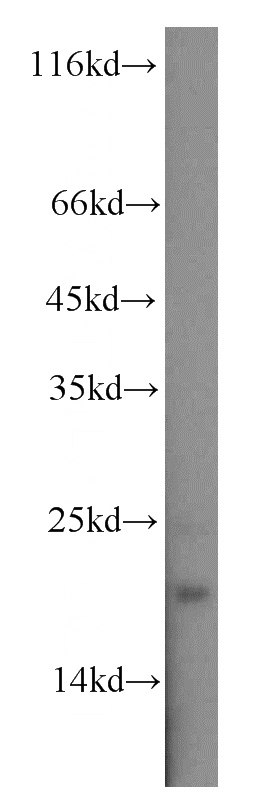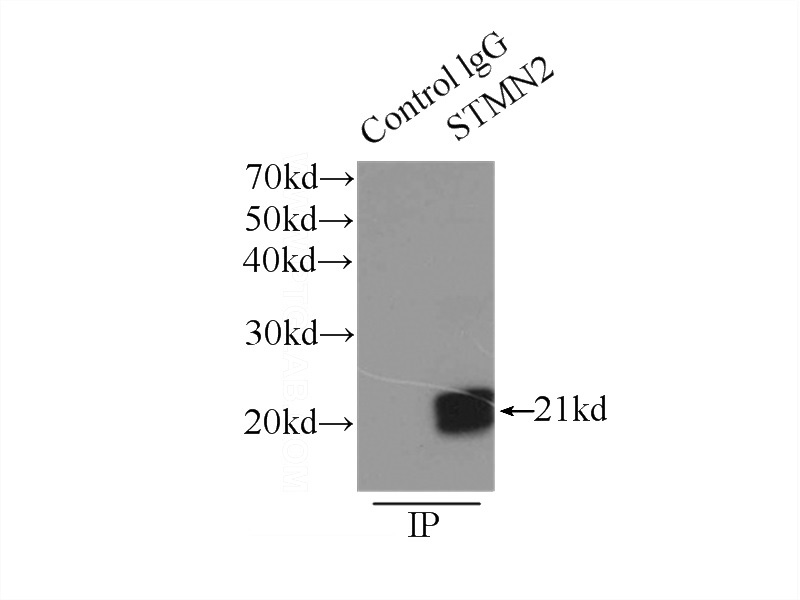-
Product Name
STMN2 antibody
- Documents
-
Description
STMN2 Rabbit Polyclonal antibody. Positive IF detected in SH-SY5Y cells. Positive IHC detected in human medulloblastoma tissue. Positive IP detected in mouse brain tissue. Positive WB detected in mouse brain tissue, mouse cerebellum tissue. Observed molecular weight by Western-blot: 18-21kd
-
Tested applications
ELISA, IHC, IP, WB, IF
-
Species reactivity
Human,Mouse,Rat; other species not tested.
-
Alternative names
Protein SCG10 antibody; SCG10 antibody; SCGN10 antibody; SGC10 antibody; Stathmin 2 antibody; stathmin like 2 antibody; STMN2 antibody
-
Isotype
Rabbit IgG
-
Preparation
This antibody was obtained by immunization of STMN2 recombinant protein (Accession Number: NM_007029). Purification method: Antigen affinity purified.
-
Clonality
Polyclonal
-
Formulation
PBS with 0.1% sodium azide and 50% glycerol pH 7.3.
-
Storage instructions
Store at -20℃. DO NOT ALIQUOT
-
Applications
Recommended Dilution:
WB: 1:1000-1:10000
IP: 1:500-1:5000
IHC: 1:20-1:200
IF: 1:10-1:100
-
Validations

mouse brain tissue were subjected to SDS PAGE followed by western blot with Catalog No:115726(STMN2 antibody) at dilution of 1:2000

IP Result of anti-STMN2 (IP:Catalog No:115726, 3ug; Detection:Catalog No:115726 1:1000) with mouse brain tissue lysate 9500ug.

Immunohistochemical of paraffin-embedded human medulloblastoma using Catalog No:115726(STMN2 antibody) at dilution of 1:100 (under 10x lens)

Immunofluorescent analysis of SH-SY5Y cells using Catalog No:115726(STMN2 Antibody) at dilution of 1:25 and Alexa Fluor 488-congugated AffiniPure Goat Anti-Rabbit IgG(H+L)
-
Background
STMN2 gene encodes a SCG10 (superior cervical ganglion-10) protein, a regulator of microtubule stability. When phosphorylated by MAPK8, SCG10 stabilizes microtubules and consequently controls neurite length in cortical neurons. SCG10 was early considered a neuron-specific growth-associated protein in Alzheimer’s disease. In the developing brain, SCG10 negatively regulates the rate of exit from multipolar stage and retards radial migration from the ventricular zone.
-
References
- Shin JE, Miller BR, Babetto E. SCG10 is a JNK target in the axonal degeneration pathway. Proceedings of the National Academy of Sciences of the United States of America. 109(52):E3696-705. 2012.
- Kynast KL, Russe OQ, Möser CV, Geisslinger G, Niederberger E. Modulation of central nervous system-specific microRNA-124a alters the inflammatory response in the formalin test in mice. Pain. 154(3):368-76. 2013.
- Kallenborn-Gerhardt W, Hohmann SW, Syhr KM. Nox2-dependent signaling between macrophages and sensory neurons contributes to neuropathic pain hypersensitivity. Pain. 155(10):2161-70. 2014.
- Mukai J, Tamura M, Fénelon K. Molecular substrates of altered axonal growth and brain connectivity in a mouse model of schizophrenia. Neuron. 86(3):680-95. 2015.
- Islam O, Gong X, Rose-John S, Heese K. Interleukin-6 and neural stem cells: more than gliogenesis. Molecular biology of the cell. 20(1):188-99. 2009.
- Heine S, Michalakis S, Kallenborn-Gerhardt W. CNGA3: a target of spinal nitric oxide/cGMP signaling and modulator of inflammatory pain hypersensitivity. The Journal of neuroscience : the official journal of the Society for Neuroscience. 31(31):11184-92. 2011.
Related Products / Services
Please note: All products are "FOR RESEARCH USE ONLY AND ARE NOT INTENDED FOR DIAGNOSTIC OR THERAPEUTIC USE"
